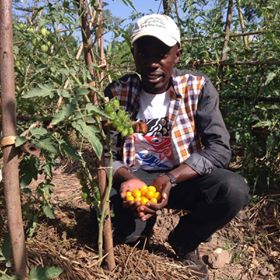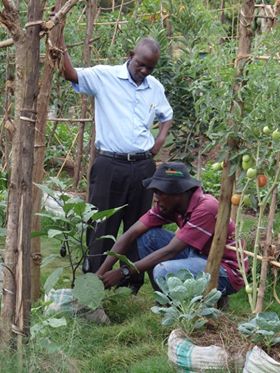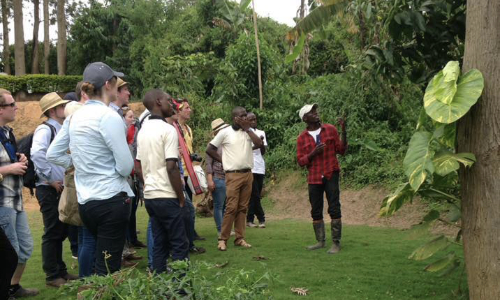To say 27-year-old Joe Male’s exploits as an agricultural entrepreneur are impressive may sound like an understatement.

The unassuming finalist of the Bachelors of Agriculture and Rural Innovation programme at Makerere University not only employs 17 workers, but is also inspiring a new breed of young Ugandans to consider agriculture as a pound for pound answer to unemployment.
Male’s initial journey was in a different field all together. He concurrently pursued a diploma in accounting and finance at Uganda Martyrs University and a course of the Institute of Chartered Public Accountants.
In 2008, he completed the diploma and a year later he became a public certified accountant.
“I thought I was going to be an accountant. I then tried looking for a job – I had a stint with a construction company and an NGO, but ends were not quite meeting.”
A visit to the family farm of his friend David Kiiza in Masaka inspired the start of Male’s remarkable journey.
“When I was at this farm which is about 3.7 acres I was amazed by the production on the land. I decided to try out the same on our family land in Gayaza,” he says. true

Armed with four pigs and 25 mango trees from his friend’s farm, Male made a beeline for the four-acre family land.
Impressed with the early results at Gayaza, Male decided to spread his wings further to Namayumba, a village located 50km away from Kampala on Hoima Road. Here, he sought to transform his late aunt’s land.
The inspired youth then started working with the farming communities around Namayumba to up their productivity.
To get villagers onboard with relative ease, he got key stakeholders like the village chairperson, the community health personnel among others hooked onto his project.
“I decided to open a community based organization – Indigenous Skills Employment (ISE). Since the pioneers understood the vision of the organization well, they have now decided to form other groups.”
Under the auspices of ISE, Male started another programme, the Community Farmers’ Network, which is currently working with 120 farmers. “Together with the community, we find their most pressing need in the value chain like crop development, disease control, and work on that,” he explains.

Business realignment
Though extremely inventive, in the beginning Male was short on the cutting edge that would transform his efforts in agriculture into a successful business venture.
To bridge this gap, Male sought the counsel of Enterprise Uganda in 2011. He was then recommended to Grow Movement – an organization that employs the consultancy skills of volunteer across the globe – to transform the businesses of people in Uganda, Rwanda and Malawi.
Working with Chinese consultant Julie Su through Skype, Male started the transformation, to begin with, by registering a company, Avail Group. Su helped him establish a financial system in this new company.
“Grow Movement opened my eyes further. I could not continue operating as a CBO exclusively. My consultant advised me to start a company to fast-track my journey in business.”
Male now supplies corporate clients in banks, schools and other institutions in the city with basketful of assorted vegetables. He also supplies markets with his produce.
To meet the demand, Male supplements whatever he produces on his farm with produce from the gardens of other farmers. Through phase farming, he produces vegetables year round and this way, he is able to meet the supply demand of his clients consistently and also pay his workers.
Besides training young people and other farmers, Avail Group helps farmers get around the fleecing middlemen and get a better price for their produce under a deliver scheme.
To supplement the income he gets from selling vegetables, Male has a seedling project, from which he sells seedlings to other farmers.

Inspiring fellow students
Male’s works are inspiring many of his classmates, and even other students into joining agriculture. He is encouraging them to transfer the innovations they learn in class to the garden.
Under the tutelage of Male as a lead architect, the students have formed the Uganda Micro-Gardening Initiative (UMGI), which seeks to encourage young people into agriculture.
“The reason I target the household approach is because young people do not have land, but their parents do, so if the parents love the idea, it is easy to get the children on board,” he says.
According to a report released by Action Aid last year titled: “Lost Opportunity? Gaps in Youth Policy and Programming in Uganda,” unemployment among Ugandan youth is at a disturbing 61.6%.
Male strongly believes that if more young people like him take on agriculture, unemployment figures will fall down drastically.
“Imagine having youth across the country with such skills and drive. The ripple-down effect would be momentous!”
With Uganda having one of the world’s youngest populations with over 78% of the population below the age of 30, it is critical to have efforts in sectors like agriculture which have the potential of employing many young people like Male and his buoyant course mates.
In this way, Uganda will make tremendous progress in achieving the first Millennium Development Goal of eradicating extreme poverty and hunger, by increasing incomes of young people and boosting food security.
London-based Claire Jenkins, the Executive Director of Grow Movement is proud of the achievements that Male has realized so far.
In an interview with New Vision, she revealed that she is committed to getting more consultants like Su to work with more young people so that their lives can be transformed.
“Many of the clients who come to us do not know whether their businesses are profitable or not. Our consultants help them get a structure in place to make their businesses profitable,” Jenkins explains.
The Japan International Cooperation Agency (JICA) has also shown interest in working with Male’s initiatives.
More interventions by organisations such as Grow Movement and JICA would propel Uganda towards achieving the last Millennium Development Goal of Global Partnerships for Development.

